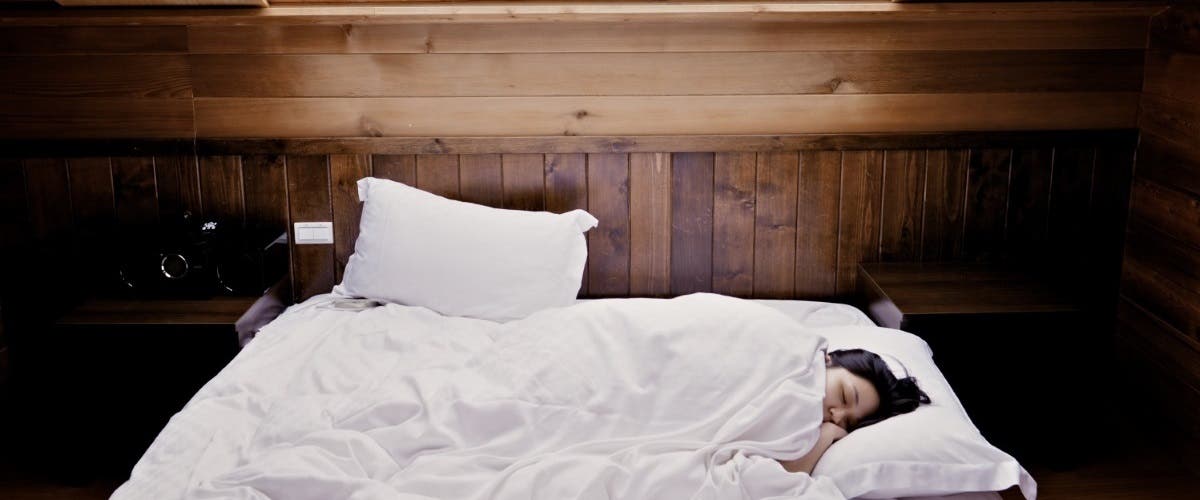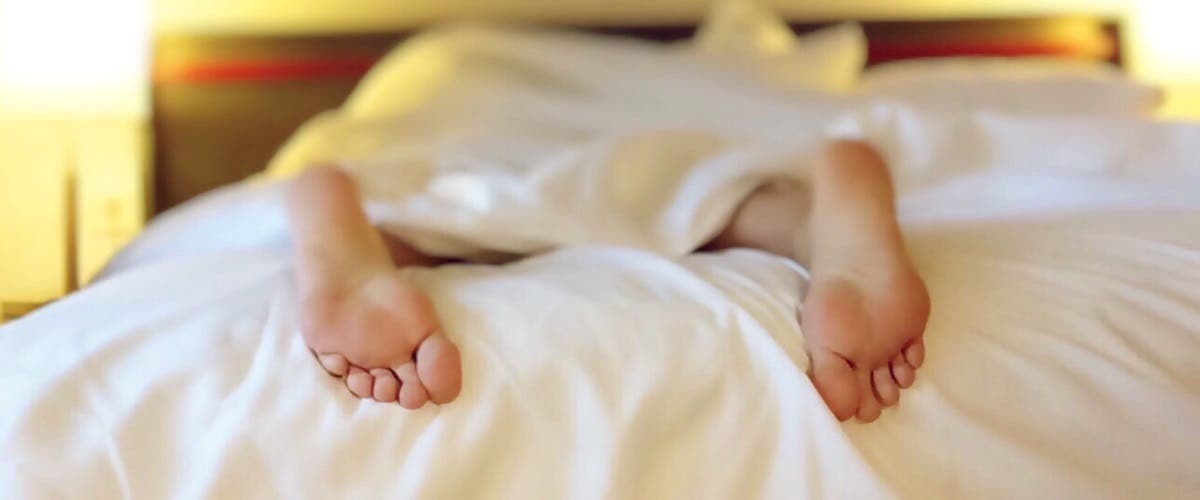How the Right Lighting Can Help You Sleep Better
Why does light affect us?
As we covered in our Lose the Jet Lag post, light is like a re-set button for your body as it controls your circadian rhythm, or body clock. This is because of special, light-sensitive cells in the retina of our eyes, which 'tell' the body when it is night or day according to the amount of light. The circadian rhythm influences many different hormones in your body, but the one that is most relevant to sleep is melatonin.
Melatonin is the hormone that makes you sleepy. The more melatonin, the more sleepy you are, the less melatonin, the more awake you are. However, melatonin production is inhibited by light, specifically blue-wavelength light, so the more light you are around, the less sleep you are likely to get.
Why not getting enough sleep is a problem?
Less sleep isn't a huge problem if it is only one night, as your body can adjust and deal with this. However, chronic sleep deprivation can lead to:
- Poor sleep quality while sleeping
- Fatigue during the day
- Poorer well-being, which can lead to problems like depression
- Motor problems
- Cognitive problems
- Less alertness
- Poorer metabolism, as circadian rhythms also regulate cortisol production, which is a response to stress and aids in metabolism of fat, protein and carbohydrate.
This is why the trend of mass sleep deprivation is so worrying, as the range of problems can be very dangerous to someone's physical and mental health.
These problems are also why things such as shift-work are a problem, as the constant rotation means a consistent sleep schedule is non-existent, leading to sleep problems.
Although all lights have the potential to change our body clocks, the one's which are the worst are blue-wavelength lights. This is because this wavelength suppresses melatonin production much more than other forms of light. On the other hand, red-wavelength lights, on the opposite end of the spectrum, are much less disruptive.
Unfortunately for bedtime, a lot more of the lights that are now available give off blue-wavelength light. However the biggest problem is phones, tablets and laptops, as these are big sources of blue light held close to the face, and currently many people spend their evenings on these devices.
What types of light affect our sleep?
Blue wavelength light is actually really helpful when trying to wake up, and experts say you should seek bright light, specifically light from outside, within the hour after waking. This is especially hard to find in winter, which is why the amount of these lights is a good thing for people wanting an energy boost, and why light boxes are becoming a bigger industry.
At night however, it's a different story.
How can I manage sleep problems caused by light?

There are many ways that you can reduce this problem, and you'll be pleased to know not all of them are to do with ditching your phone.
To start, counter-intuitively getting more light during the day may actually help you sleep better at night. 2014 study published in the Journal of Clinical Sleep Medicine, researchers found that 22 workers who did have daylight during the day via a window, had better well-being and sleep quality than 27 windowless workers. This might be because this lets the body know that it is day-time, setting the sleep schedule in motion so you feel tired at the right time, and also because if you get a lot of light during the day, although you may use a phone or watch TV before bed, the difference in daylight and night-light is significant enough to make your brain realise it is night time.
Also, limiting your exposure before bed time is probably the best solution. Many recommend trying to have no lights at least one hour before bed, as this darkness helps the body's production of melatonin. Furthermore, making sure you're room is really dark in general can help and can be achieved by blackout blinds to block any outside lights from spoiling you shut-eye.
However, realistically, who is going to give up checking Twitter before bed? Ways to reduce your exposure without giving up entirely is to use smaller screens, as your phone will give off less blue light than your tablet, simply because there is less surface to give off light. Also reducing the brightness will help, as the brighter it is, the more the light will hit the back of the eye, causing greater disruption. Also, if you just have to check that text, holding the phone further away from your face will help, as this distances the light from your face, slightly reducing the light's affect.
Also, laptops and Android phones can get display-altering software such as f.lux, which changes the blue light being emitted, into an orange or red light. Although things will look weird for a moment, apparently the eye adjusts to this, and things return to normal. However, iphone users will have to use a physical filter, as Apple won't allow you to change the set display.
Those that like to snuggle up with a book may also be unwittingly exposing themselves to blue light. This can be controlled by using warm-coloured bulbs.
Another, more extreme way of dealing with this is to try and re-set your clock by getting away from the lights altogether. Urban settings are filled with lights of all different wavelengths, whereas rural settings aren't, so a study from the University of Colorado suggests camping can trick the brain into its natural rhythm. Even proclaimed 'night-owls' will find themselves sleeping earlier and waking earlier. This can hep you work out how much sleep your body needs, which you can try and integrate into daily routine.
Top tips for better sleep

As well as managing lights and light exposure, there are many other tips and tricks for trying to get more sleep:
- A good mattress- A comfy bed makes you actually want to go to bed, and makes falling asleep easier.
- Consistency- Even if you go to bed slightly later one night, try and wake up at the same time the next morning. This kind of schedule will become ingrained so your sleep schedule should become second nature
- Exercise every day- Just not straight before bed, as the extra adrenaline will keep you up.
- Don’t hit that snooze button- Don't do it! This just means you get an extra few minutes of rubbish sleep before waking up, which can actually result in you feeling worse through out the day
- Have a routine at bedtime- This then becomes a signal to your brain that it's time for sleep, automatically causing you to feel tired.
- Avoid alcohol and caffeine- Avoid these up to 4 hours before you go to sleep. Both these are stimulants and will keep you awake, and even if you do get to sleep, it will not be the deep Stage 3-4 sleep you need.
- If you can't get to sleep in 20 minutes, get up again- Get up and do something else such as read until you feel sleepy enough to go to sleep. It's not the ideal, but stressing about going to sleep will only make it harder to do!
- Turn the alarm clock away- Watching the clock only makes you more stressed out, which can spiral into an anxiety about falling asleep.
- White noise- Some people can't sleep in total silence, and so white noise can be calming. Also other noises are less likely to appear as loud, and so shouldn’t wake you up.
- Think of it as Rest not Sleep- If you feel anxious about falling asleep, then even the name might be daunting. So, by saying the time is for rest, rather than for sleep, it takes the pressure away from actually sleeping.
If you try a few of these things, and your sleep problems still persist, or if they get worse, go and seek professional advice from a doctor.
You can browse our collection of LEDs and lamps for warm-coloured light bulbs. For more information contact the LampShopOnline team on 0113 8876270.
Resources used for this article:
Huffington Post: http://www.huffingtonpost.co.uk/dr-nerina-ramlakhan/sleeping-pills_b_5633845.html
Fast Company: http://www.fastcompany.com/3042717/sleep-week/8-ways-to-use-your-gadgets-at-night-and-still-get-a-good-nights-sleep
The Art of Manliness: http://www.artofmanliness.com/2014/10/20/how-to-get-a-good-nights-sleep/
Published 2014/05/14
